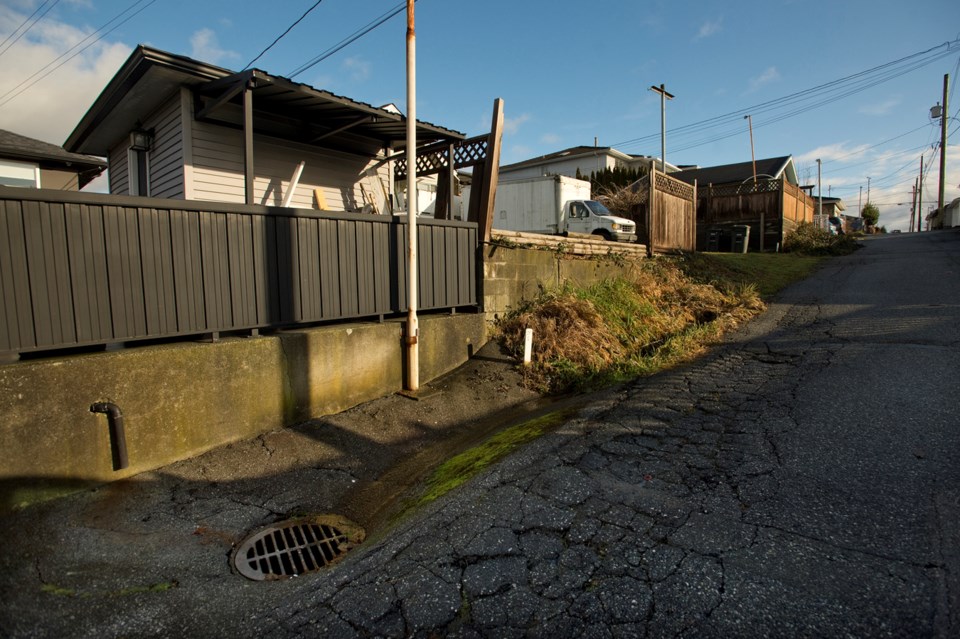A Burnaby homeowner says the City of Burnaby is still not listening to residents about what he calls “unfair” bylaw that could cost him more than $33,000.
Dave Hayre plans to tear down and replace his home on Napier Street in the Willingdon Heights neighbourhood. He said he purchased the property in 2006 with the intention to redevelop.
But, Hayre said, he didn’t expect his building budget to include paying the city’s costs associated with connecting his property to a storm drain line behind his property and replacing a ditch that drains into a watch basin at the bottom of the sloped lane.
The city told him he needs to pay $33,277 to cover the work before it issues a building permit for his new home.
Hayre and a group of residents have been fighting the city on this rule ever since.
“We believe this bylaw was quietly passed and is an unethical approach at burdening property owners with a cost towards which they have already contributed to,” he told the NOW, adding that the costs could hit people for anywhere from $10,000 to $48,000 per property.
Hayre was featured in a January 2020 NOW article on the issue and he is trying to raise awareness with what he estimates are more than 6,000 Burnaby homeowners who could be impacted by this bylaw.
Hayre is one of five Napier Street owners who co-signed a letter to the city in June asking for changes to this rule.
“The City of Burnaby officials and councillors refuse to notify affected property owners,” Hayre said. “This bylaw was created to dump the cost of infrastructure of storm sewers onto unsuspecting property owners. Most of these properties have ditches in the front, rear or side of their properties that carry city rain water.”
The fee is being charged to Hayre as a result of a bylaw passed by city council in 2017, according to Jonathan Helmus, Burnaby’s assistant director of engineering for infrastructure and development, in a January interview with the NOW.
Hayre’s redevelopment will initiate the city to extend the sewer line along the lane behind his entire block, Helmus said, but Hayre will only have to pay for the share of the project behind his property.
The city will pay for the rest of the new infrastructure upfront and charge Hayre’s neighbours for their share only once they submit a building permit for a project exceeding $250,000, he said.
“If they are doing a significant addition where they may impact their drainage for their property, and they're doing potential excavation on their property and they're spending $250,000, we're saying then that can be an appropriate time to connect their house to the storm sewer,” Helmus told the NOW.
The goal is to one day connect the 20% of detached homes that currently aren’t hooked up to the city’s storm sewers, he said, and by making homeowners pay for the upgrades, the City of Burnaby will save an estimated $200 million, he said.
Changing climate and housing trends give the initiative urgency, Helmus said.
“With more parking space, with a much bigger house, they're throwing a lot of water into the lane and the ditch is not designed for that kind of water and certainly not with climate change,” he said. “We're concerned that if everyone is trying to connect to the ditch, that the ditch is just going to erode away, it's going to flood, and that would be a problem.”
Hayre said he doesn’t think he should have to pay for the work.
“I think it's really unfair that they're forcing people to pay for infrastructure that is not even on their own property,” he said.
But Helmus said it wouldn’t be fair for the general taxpayer to bear the burden of paying for the upgrades because property owners living in homes already connected to storm sewers either paid for the connection when they build their home or that cost was passed down to them when they bought it.
- With files from Kelvin Gawley, Burnaby NOW



